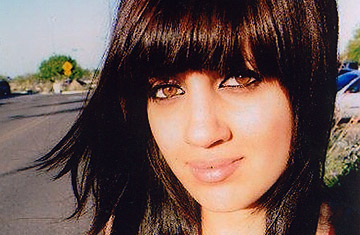
Noor al-Maleki
(3 of 3)
As soon as Faleh sped off, the Peoria police were on the case. Lead detective Chris Boughey and his partner met with Ali, Faleh's oldest son, who initially said that he hadn't spoken to his father since before the assault. The next day, another detective called Noor's mother, Seham, as she was driving home from California. Seham was so difficult to interview — she kept yelling at the officer that Khalaf was a liar — that the police asked a local Muslim leader to act as an intermediary.
Within a week, Faleh was apprehended when he tried to enter the U.K. He had headed to Mexico and then flown to London. He was extradited to the U.S.
In an interview with Boughey and another officer, Faleh characterized the incident as "kind of an accident," saying he "lost control." He insisted that he loved Noor, saying that he had pictures of her on his cell phone to prove his claim.
Faleh told the officers that in his culture, his daughter should not have left the house and was not supposed to be "Americanized." He added, "I know the culture is outside, and we are inside, we are outside. You see what I'm saying?"
When Boughey probed deeper, Faleh admitted that he had wanted to "scare" Noor. Boughey then asked if he tried to hurt Noor. Faleh looked down, sighed and nodded his head in agreement. According to the police transcript of the interview, he made a final attempt to explain himself, comparing Noor's behavior to part of his house being on fire and asking the detective, "So we burn all the house, let the house burn or we try to stop the fire?"
The Peoria police said they were investigating the extent to which family members were involved, but to date, no charges have been brought against anyone other than Faleh. Both Ali and Seham initially denied speaking to Faleh after he ran over Noor, just before 2 p.m. But records of his cell phone showed five calls between Faleh's phone and Ali's between 1:16 p.m and 2:30 p.m. In a similar time frame, there were 12 calls between Faleh's phone and the phone Seham told police she was using in California. Faleh also called a male relative in Detroit. And about 15 minutes after the crash, he called his cousin in Phoenix.
In the days following his disappearance, police learned that Ali and Seham had filled a prescription for Faleh, an insulin-dependent diabetic, and stopped by the workplace of the cousin. Faleh also admitted to Boughey that he called the cousin for money; the cousin sent someone over the border with $1,900.
While they appeared to have helped Faleh escape, did the family members know beforehand that Noor was in danger? During a phone call in Arabic to her husband at the jailhouse (Faleh didn't know the police were taping his calls), Seham scolded him for killing Noor, saying, "You rushed into it, Faleh. Honestly, you rushed into it."
Aftermath of a Murder
"The whores ... burned us," Faleh said in another jailhouse conversation with his wife. He added, "They destroyed me." Seham responded, "May God seek revenge on them, God willing."
Seham reassured her husband that "the people are not letting you down. They know you are a good-hearted person and have nothing." At a later point, Faleh urged her to round up Iraqis from his tribe to protest his imprisonment at the American consulate. "No one hates his daughter, but honor is precious, and nothing is better than honor, and we are a tribal society that we can't change," Faleh said. "I didn't kill someone off the street; I tried to give her a chance."
At her husband's advice, Seham tried to drum up support and raise more than $100,000 in cash for a lawyer. She met with the imam at al-Rasool Mohammed, a Shi'ite mosque in Peoria popular among the Iraqi immigrants, many of whom speak limited English. Seham attended the mosque a few times, but she stopped going when no money was forthcoming. She also petitioned the Iraqi Cultural Association, without success.
It is easy for the community to distance itself from Faleh now that he is a convicted murderer. But who spoke up for Noor when she was reportedly being brutalized at home and forced into an arranged marriage? Did any of Faleh's contemporaries defend her right to dress herself how she wished? Why is Khalaf's husband so quick to insist that Noor was a virgin and never involved with his son? Why do the teenage girls at al-Rasool mosque scold Noor for violating the precepts of their religion?
The attitudes that fueled Faleh's rage are widespread in his community. It is no coincidence that Faleh believes that Iraqis in the U.S. and abroad will judge him more kindly if they think it's an honor killing. "Connect it to honor," Faleh advised Jamal from jail.
Asked whether the community has taken away any lessons from Noor's murder, the owner of an Iraqi grocery store in Peoria nods, explaining, "They don't want their daughters to become like Noor."
Saher Alyasry, a mother in her mid-30s praying at al-Rasool mosque, speaks out firmly, in Arabic, while her teenage daughter, rocking a newborn, translates. "I think what he did was right. It's his daughter, and our religion doesn't allow us to do what she did," she says. "A guy who cares about his reputation, he should do that because people will start talking about him if he doesn't." When asked if honor is more important than love, she responds, "Yes. What's the point of loving her if she's bad?"
According to the police report, as Noor lay in a coma, every time Seham touched her daughter, Noor's heart rate spiked. She was unplugged after her doctors informed the family that she was clinically brain dead. Only then did she reach a place where her family could no longer hurt her.
